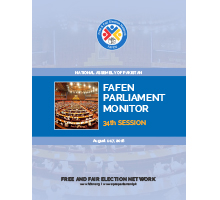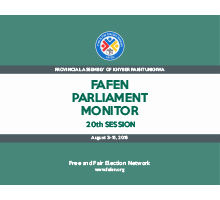- Low Attendance of Lawmakers Continue; Legislators Take Up Number of Human Rights Issues
- Prime Minister Attends One Sitting; PTI Chairman Remains Absent Throughout the Session
ISLAMABAD, August 19, 2016: The National Assembly passed important government legislation, including the much-debated Prevention of Electronic Crimes Bill 2016 and left out most of the Private Members’ agenda during 34th session of the Lower House of Parliament.
The House spent some considerable time in discussing Indian atrocities in Occupied Kashmir, explosion in Madina Munawara and terrorist attack in Quetta while the Motion of Thanks to the President for his address to the Parliament was ignored despite appearing on the agenda throughout the session. The House paid tributes to the assassinated Qawwal Amjad Fareed Sabri and the deceased social worker Abdul Sattar Edhi besides condemning the Indian aggression in occupied Kashmir and incidents of terrorism.
Leader of the House Muhammad Nawaz Sharif came to attend the Assembly’s proceedings after nearly three months on August 10 and addressed the House on fight against terror. Usually a regular parliamentarian, the Leader of the Opposition Syed Khurshid Ahmad Shah also missed more than half of the 34th session (eight sittings). Among other notable parliamentarians, Chairman PTI Imran Khan did not come to the House throughout the session while Parliamentary Leader of MQM Dr. Muhammad Farooq Sattar attended only one sitting. The parliamentary leader of largest opposition party PPPP Syed Naveed Qamar remained the most regular by attending all sittings.
The attendance of other lawmakers showed mixed trend as three sittings were adjourned prematurely due to lack of quorum. The highest attendance (69%) was recorded during eighth sitting when the Prime Minister was present.
The House suspended its regular agenda twice to discuss other matters of urgent importance while it left some part of a sitting’s agenda unaddressed. The Private Member’s agenda was the biggest casualty as none of the Private Members’ resolutions and Motions under Rule 259 were taken up during the entire session. However, all of the legislative proposals put forward by Private Members were addressed. On the other hand, the treasury legislation focused on economy, cyber-crimes, energy and institutional reforms while the private members’ legislative proposals were concerned with the issues of transparency, accountability, human rights and matters related to the federation.
Human Rights Issues
A number of human rights issue were raised by the lawmakers during the entire session. The human rights violations by security forces in Indian Occupied Kashmir were highlighted time and again during the proceedings. The House dedicated a sitting for discussion on this matter.
The legislators also submitted Motions under Rule 259 regarding incidents of violence against women, and provision of expeditious and inexpensive justice. However, these motions were not taken up by the House.
Through Calling Attention Notices (CANs), the lawmakers raised the issues of Pakistani expatriates stranded in Saudi Arabia and non-payment of salaries to Federal Urdu University’s teachers and staff since several months. The government made statements on these issues.
The human-rights specific legislative proposals also appeared on the agenda, however, not all of them were introduced in the House due to the absence of sponsors. The lawmakers proposed to reserve quota for women judges in the Islamabad High Court, increase punishments for child pornography and sexual abuse, establish mechanism for handling cases of torture, custodial death and custodial rape and widen the scope of anti-sexual harassment law to educational institutions. Besides these proposals, bills were also tabled seeking provision of mechanism for welfare of unattended orphan children, mechanism to keep the medical consultancy and other facilities in range of common man and employment opportunities for disabled persons. A number of bills regarding minority rights were also on the agenda but were dropped due to the absence of their movers.
The lawmakers also asked 27 Questions that were directly related to the state of human rights in the country. These questions were related to the Internally Displaced Persons, violence against women, legal aid being provided to the Pakistani prisoners in foreign jails, misuse of blasphemy laws, and forced conversions.
To download complete report, click here



